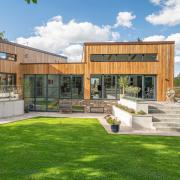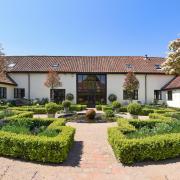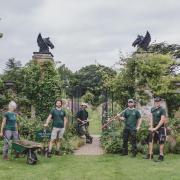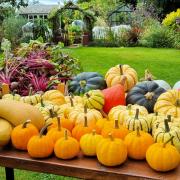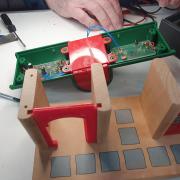In 2017, Lucy Hutchings set out on a mission to grow as much as she possibly could in her tiny Suffolk back garden. Surprisingly, for a former jewellery designer, she turned out to be a dab hand at horticulture. But the jungle of fruit and veg taking over her modest plot presented a bit of a dilemma. How was she going to cook hundreds of decorative heirloom tomatoes and beautifully mottle-skinned beans?
To the rescue came Mike Keen, chef and Arctic adventurer who had run her favourite pub, The Freston Boot. He answered her plea for help and they've been together since, carving out a new life at Cedarwood Homestead in Holton St Mary.
There’s still work to be done on renovating what was essentially a falling-down wreck. Mike admits he struggled even to put a shelf up before they took on the property a little over a year ago. Now he turns his hand to anything from plumbing to plastering.

In the kitchen he cradles a Kilner jar of experimental acorn coffee. I'm assured "it tastes pretty much like the real thing”. With its slick, country-style units and oversized headspace, the kitchen is the hub of their lives. The dining table, strewn with spent coffee cups and books, looks out across the garden, a snug corner hides a sofa. Cupboards and drawer units have been found on their travels, each weathered by the hands of previous owners. Bottles and jars line shelves, their jewel-coloured contents showcasing Mike’s forays into preserving and fermenting. “The dried tomato powder is amazing,” Lucy says.
As well as a family home for the couple and Lucy’s two young children, Cedarwood Homestead is intended as a place to earn a living - sustainable, manageable, seamlessly weaving together their shared passions. From the site they’re running courses (small classes) on a vast range of topics. In the garden, Mike has built his own barbecue and smoker alongside what he calls an ‘arena’, facing a dilapidated pig shed. Eventually he’ll have a professional kitchen for classes here, and will offer outdoor demonstrations and moonlit supper clubs, which all sounds rather romantic . . .

Lucy, author of Get Up And Grow, turned to gardening at a tumultuous time in her life. She’d left the fashion industry, deciding it was no longer for her, and went on to have her daughters. In 2017 she was at a low point, so throwing herself into a hobby proved welcome solace. “I was growing plants that were pretty. But they had to be edible as well,” she says. “Somewhere down the line I started to deep dive into forgotten edibles and ornamentals you can eat, and heritage things. The kind of vegetables the Victorians were crazy about, but that we don’t eat anymore.
Her sister suggested Instagram, so she started an account (@shegrowsveg) and now has more than 160,000 followers. "I wasn’t buying or using gardening books. I was trying interesting things, and growing plants in different places and at different times of year. Probably people liked it because I was a designer and I was able to take photographs that grabbed their attention.”

In 2019, swamped by veg, Lucy contacted Mike. “I had no idea he’d left The Boot by then,” she says, “but I did manage to get in in touch with him." It was a simple proposition: ‘I grow loads of really weird stuff no one knows how to eat – do you want to cook it and make some videos together?'
“We definitely shared the same dream,” says Lucy. That dream was to be as self-sufficient as possible. On his travels, Mike has seen first-hand how preserving, feeding off the fat of the land, and being creative and aware in the kitchen, is more prevalent in some other countries. In a something-or-nothing move, having been tied to restaurants for years, he gave up The Boot and decided it was time to do something purely for himself. He spent months travelling in Denmark, the Faroe Islands, Iceland and Greenland, dining on the likes of smoked seal fat.
“It made me think a lot about the food culture here,” he says. “Post-World War II only 3 per cent of people had an electric fridge. What were they doing before then? We can’t imagine it, can we? We’ve got to the stage where people are throwing away bread as soon as it’s got a bit of mould on it. Seventy years ago we would have done something with stale bread or curdling milk.”
Lucy agrees. “We’re so dependent on supermarkets. At the beginning of the pandemic when the shelves were empty it was a shock. Our food security was threatened. Now food prices and fuel prices are going up, that’s out of our control. I think more people are starting to think about growing some of their food to take back a bit of that control. That’s what we can show them here.”
The pair bought Cedarwood, despite warnings from the estate agent about its condition (so bad they refused to do viewings), but the plot had everything they wanted - land, a view of the countryside, no overlooking neighbours, and space to grow. Dating back to the 1940s, the wooden kit house was built by a farmer and was once a much-loved family home. “When we went inside the ceiling was caving in,” says Lucy. “There was rainwater on the floor, no carpet because the carpet moth had eaten it all, and it stank because animals had got in.”

They were undeterred, although not long into the renovation the price of building materials doubled and they had to make a decision to stop all trades people once it was a waterproof shell. With limited knowledge and a list of Youtube links, they became their own labourers. “You have to learn very quickly,” Mike admits. “Doing the insulation was the worst, and plaster-boarding the ceilings. We did that, and plastering, installing the kitchen and bathrooms, external plumbing and waste systems, the cladding, the patio, bricklaying, all the decoration.” Now it's a warm, bright, four-bedroom, three-bathroom home bearing no resemblance to the tumbledown shack it once was.
Outside, ducks waddle in a fruit cage filled with currants, gooseberries, jostaberries, raspberries, aronia berries and Japanese wineberries. Lucy has plans for more fruit trees and shrubs, especially over in the orchard, which struggled in the hot summer. “You can never have too much fruit, can you?” The centrepiece is a series of intricate beds, set out in the pattern of a Victorian kitchen garden. Lucy's aim was to show that a garden can be both beautiful and edible.
"I’ve never understood why there’s such a big divide between traditional kitchen and ornamental gardens. There’s actually no difference between them.” Onions, garlic, shallots, winter wheat, leeks, radicchio, salsify and beetroot all grow here. Trying to establish plants in one of the hottest summers on record proved tricky. “I got to the point where I had to pick and choose what was worth watering. But tropical fruit did well in the polytunnel. We had pomegranates, loads of watermelons, tomatoes, chillies and peppers, too.”
A sprawling patch of giant pumpkins, green and knobbly, look like they’ve been pulled from a swamp in a Grimm fairy tale. In the root cellar, decorated by Lucy Tiffany, who spent a week painting a cheery mural in Cedarwood’s kitchen, are gourds of every colour, shape and size.
The polytunnel provides year-round growing. “It’s not heated," says Lucy. "In mid-winter last year, when our fingers were numb, we’d come in here, strip off our jumpers and eat lunch.” Everything, except a pair of loofahs destinated to become handy cleaning sponges, is grown for flavour. Baby pomegranates, Chinese snake gourd and finger limes are intercropped with kale and kohlrabi. Then there are the tomatoes - some scarlet, the size of a button, others purple-black, still others which slice open to reveal a kaleidoscope of colours.
“My top three are always Black Beauty which is a jet-black tomato that is very beautiful but also really, really tasty. Ananas Noir is brilliant yellow and green on the outside, but inside has a burst of red, yellow, orange and green. And Pink Berkeley Tie Dye has a tie dye effect inside. They all taste incredible.” Seeds for many of the varieties grown at Cedarwood are available to buy on the website (cedarwoodhomestead.com).
In a huge paddock, five pygmy goats bound, leap and trot playfully. They are, Lucy says, for fun, not for eating. "They’re like little dogs. They’re hilarious and have so much personality.” Mike's ‘arena’ and pig sheds are a work in progress. “Turning our dream into a business was always part of the picture,” he says. “There’s a fair bit of work to be done. I’m going to make a tandoor oven, and put in a pizza oven and barbecue, maybe a pit, so we can do all sorts of outdoor cooking.
“When the pig shed is done we’ll transfer most of the courses into there with hands-on cooking stations, and we’ll let it out for photography and food development. It’s going to give us a lot more scope.”
And when good weather returns there will be pop-up foodie events. “The bit I love about restaurants is that buzz on a Saturday night when the tickets come in, and being creative. Here we can get a bit of music going, and theme some events. We might do classic pub dishes one night, or an evening of hot and cold smoked food. There’s no end to what we can create, really.” It will be tied into the garden. Gluts of produce will be used for events and people will be able to see ingredients grown, picked and cooked.

Mike and Lucy regularly produce videos for their Youtube channel, where viewers can take advantage of the knowledge they’ve gleaned such as when and where to plant tomatoes, what to do with a glut of courgettes, or how to make that ‘very interesting’ acorn coffee.
“Some will be Lucy in the garden, maybe showing how to transition a polytunnel from summer to winter,” Mike explains. “Then you might have me showing how to make a passata from raw tomatoes, or building a cobb oven, or pressure canning.”
The courses will reflect the videos. “One will be spending the morning with Lucy learning about different tomatoes, the seeds and growth habits, what grows best, how to propagate and prune," says Mike. "Then people will spend about two or three hours in the kitchen learning how to make pasta sauce and pizza sauce, how to roast tomatoes, how to dehydrate them and freeze them." People will also be able to learn how to plant a garden to provide homegrown food all year round, and Mike will show how to dry, cure, smoke and ferment.
“This place has opened a lot of options up for us,” says Mike.




